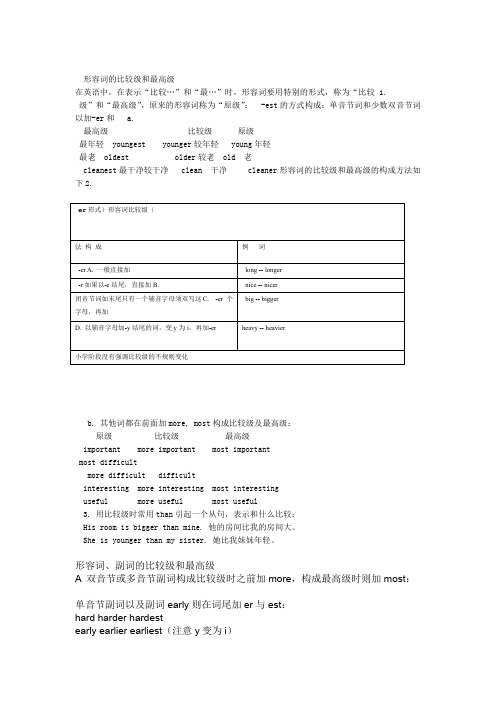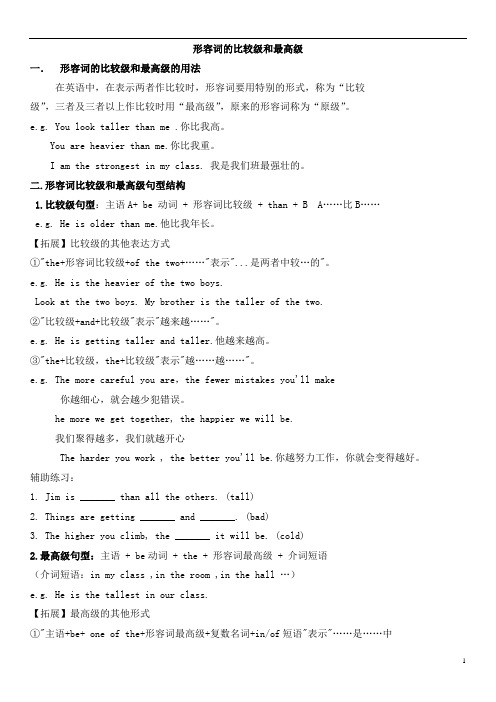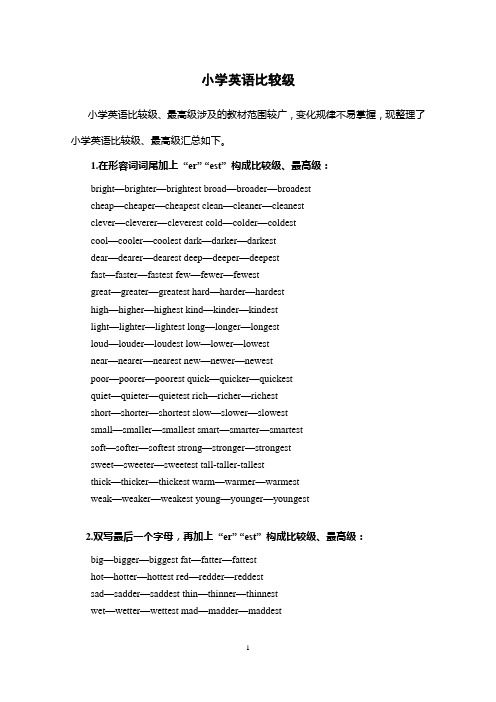小学英语形容词比较级
完整小学英语比较级和最高级

形容词的比较级和最高级在英语中,在表示“比较…”和“最…”时,形容词要用特别的形式,称为“比较 1.级”和“最高级”,原来的形容词称为“原级”: -est的方式构成:单音节词和少数双音节词以加-er和 a.最高级比较级原级最年轻 youngest younger较年轻 young年轻最老 oldest older较老 old 老cleanest最干净较干净 clean 干净 cleaner形容词的比较级和最高级的构成方法如下2.b. 其他词都在前面加more, most构成比较级及最高级:原级比较级最高级important more important most importantmost difficultmore difficult difficultinteresting more interesting most interestinguseful more useful most useful3. 用比较级时常用than引起一个从句,表示和什么比较:His room is bigger than mine. 他的房间比我的房间大。
She is younger than my sister. 她比我妹妹年轻。
形容词、副词的比较级和最高级A 双音节或多音节副词构成比较级时之前加more,构成最高级时则加most:单音节副词以及副词early则在词尾加er与est:hard harder hardestearly earlier earliest(注意y变为i)B 不规则变化:well better bestbadly worse worstlittle less leastmuch more mostfar farther farthest(仅用于指距离)further furthest.much,more,mostA more和most的用法相当自由:You should ride more.你必须多骑马。
PEP小学英语形容词比较级最新版本ppt课件

最新版整理ppt
1
一.形容词的概念
1. 形容词是用来修饰和描述名词,通 常放在名词之前
a blue cap
a big orange
形容词既可修饰单数也可修饰复数
a red strawberry three 最新版整理ppt red strawberries 2
2.形容词可以放在 be 动词之后,用来 叙述和说明主语
understand
看图并理解
biggest
最新版整理ppt
big bigger
7
◇Look at the pictures
and understand
看图并理解
fast
fastest
最新版整理ppt
faster 8
三、形容词的级
形容词有三个等级: 原级、比较级、最高级
1.原级:即形容词的原形。
angrier easier busier 10
最新版整理ppt
11
2. 不规则变化
【巧记】:
特殊形式比较级, 共有三对二合一, 坏病两多和两好
little意思不是小, 一分为二有两个, 一是老来二是远
最新版整理ppt
12
bigger big
biggest
The dog is bigger than the mouse. The horse is the biggest of all.
形容词最高级句式的结构:
主语 + be + the + 最高级 + of / in…..
最新版整理ppt
16
young
cheap
¥30
¥20
tall
11:语法专练十一:小学形容词的比较级和最高级

形容词的比较级和最高级一.形容词的比较级和最高级的用法在英语中,在表示两者作比较时,形容词要用特别的形式,称为“比较级”,三者及三者以上作比较时用“最高级”,原来的形容词称为“原级”。
e.g. You look taller than me .你比我高。
You are heavier than me.你比我重。
I am the strongest in my class. 我是我们班最强壮的。
二.形容词比较级和最高级句型结构1.比较级句型:主语A+ be 动词 + 形容词比较级 + than + B A……比B……e.g. He is older than me.他比我年长。
【拓展】比较级的其他表达方式①"the+形容词比较级+of the two+……"表示"...是两者中较…的"。
e.g. He is the heavier of the two boys.Look at the two boys. My brother is the taller of the two.②"比较级+and+比较级"表示"越来越……"。
e.g. He is getting taller and taller.他越来越高。
③"the+比较级,the+比较级"表示"越……越……"。
e.g. The more careful you are,the fewer mistakes you'll make你越细心,就会越少犯错误。
he more we get together, the happier we will be.我们聚得越多,我们就越开心The harder you work , the better you'll be.你越努力工作,你就会变得越好。
辅助练习:1. Jim is _______ than all the others. (tall)2. Things are getting _______ and _______. (bad)3. The higher you climb, the _______ it will be. (cold)2.最高级句型:主语 + be动词 + the + 形容词最高级 + 介词短语(介词短语:in my class ,in the room ,in the hall …)e.g. He is the tallest in our class.【拓展】最高级的其他形式①"主语+be+ one of the+形容词最高级+复数名词+in/of短语"表示"……是……中最……之一"e.g. Beijing is one of the largest cities in China.②序数词+最高级e.g. Hainan Island is the second largest island in China.辅助练习:1.The changjiang river is ____________________ (long) river in China.2. The Yellow River (Huang He) is ________________ (第二长)river in China3.A.形容词的比较级和最高级变化规则B. 部分双音节与多音节的词比较级在原级之前加more, 最高级在原级之前加most beautiful---more beautiful---most beautifulinteresting--- more interesting –most interestingdifficult--- more difficult – most difficultC.不规则变化的形容词:little / few - less – least good – better - bestbad/ill - worse – worst far -- farther/further—farthest/furthestmany/much – more – moste.g. 比较一下下列句子,领悟原级、比较级、最高级的用法。
小学英语比较级

小学英语比较级小学英语比较级、最高级涉及的教材范围较广,变化规律不易掌握,现整理了小学英语比较级、最高级汇总如下。
1.在形容词词尾加上“er” “est” 构成比较级、最高级:bright—brighter—brightest broad—broader—broadestcheap—cheaper—cheapest clean—cleaner—cleanestclever—cleverer—cleverest cold—colder—coldestcool—cooler—coolest dark—darker—darkestdear—dearer—dearest deep—deeper—deepestfast—faster—fastest few—fewer—fewestgreat—greater—greatest hard—harder—hardesthigh—higher—highest kind—kinder—kindestlight—lighter—lightest long—longer—longestloud—louder—loudest low—lower—lowestnear—nearer—nearest new—newer—newestpoor—poorer—poorest quick—quicker—quickestquiet—quieter—quietest rich—richer—richestshort—shorter—shortest slow—slower—slowestsmall—smaller—smallest smart—smarter—smartestsoft—softer—softest strong—stronger—strongestsweet—sweeter—sweetest tall-taller-tallestthick—thicker—thickest warm—warmer—warmestweak—weaker—weakest young—younger—youngest2.双写最后一个字母,再加上“er” “est” 构成比较级、最高级:big—bigger—biggest fat—fatter—fattesthot—hotter—hottest red—redder—reddestsad—sadder—saddest thin—thinner—thinnestwet—wetter—wettest mad—madder—maddest3.以不发音的字母e结尾的形容词,加上“r” “st” 构成比较级、最高级:able—abler—ablest brave—braver—bravestclose—closer—closest fine—finer—finestlarge—larger—largest late—later—latestnice—nicer—nicest ripe—riper—ripestrude—ruder—rudest safe—safer—safeststrange—stranger—strangest wide—wider—widestwise—wiser—wisest white—whiter—whitest4.以字母y结尾的形容词,把y改为i,再加上“er” “est” 构成比较级、最高级:busy—busier—busiest dirty—dirtier—dirtiestdry—drier—driest early—earlier—earliesteasy—easier—easiest friendly—friendlier—friendliestfunny—funnier—funniest happy—happier—happiesthealthy—healthier—healthiest heavy—heavier—heaviesthungry—hungrier—hungriest lazy—lazier—laziestlucky—luckier—luckiest naughty—naughtier—naughtiestnoisy—noisier—noisiest pretty—prettier—prettiestsilly—sillier—silliest spicy—spicier—spiciestthirsty—thirstier—thirstiest ugly—uglier—ugliest5.双音节、多音节形容词,在单词前面加上“more” “most” 构成比较级、最高级:afraid—more afraid—most afraidbeautiful—more beautiful—most beautifulcareful—more careful—most carefulcheerful—more cheerful—most cheerfulcrowded—more crowded—most crowdeddangerous—more dangerous—most dangerousdelicious—more delicious—most delicious difficult—more difficult—most difficult exciting—more exciting—most exciting expensive—more expensive—most expensive famous—more famous—most famous frightened—more frightened—most frightened frightening—more frightening—most frightening hard-working—more hard-working—most hard-working helpful—more helpful—most helpful honest—more honest—most honest important—more important—most important interesting—more interesting—most interesting polite—more polite—most politeterrible—more terrible—most terribletired—more tired—most tired6.不规则变化的形容词:bad—worse—worstfar—farther—farthestgood—better—bestill—worse—worstlittle—less—leastmany—more—mostmuch—more—mostold—older—oldestwell—better—best。
四形容词和副词的比较级最高级

四、形容词和副词的比较级、最高级(Comparison of Adjectives and Adverbs)I. 形容词比较级和最高级的形式一、形容词比较级和最高级的构成⑥合成形容词的比较等级•大多数在前面加more及most。
例如:home-sick, more home-sick, most home-sickup-to-date, more up-to-date, most up-to-date•若第一个词是大家熟悉的单音节词,则-er及-est都加在这个词的前面。
例:Long-lasting, longer-lasting, longest-lastinghard-working, harder-working, hardest-workingKind-hearted, kinder-hearted, kindest-heartedWell-known, better-known, best-known二、不规则形容词的比较级和最高级形式II.副词比较级和最高级的形式副词比较级和最高级的变化形式与形容词基本上一样。
一、一般副词hard→harder →hardest fast→faster →fastestlate→later →latest early→earlier →earliest二、特殊副词well →better →best much →more →mostbadly →worse →worst little →less →least三、开放类副词开放类副词即以后缀-ly结尾的副词不能像形容词那样加-er或-est,而应在副词原形前加more或most。
如:quickly →more quickly →most quickly quietly →more quietly →most qui etlyIII.形容词与副词比较级和最高级的基本用法一、比较级1.比较级通常由“形容词(副词)比较级+than+…”构成,表示在两者中间一方比另一方“更加……”。
小学英语形容词、副词比较级:更聪明的学生

小学英语形容词、副词比较级:更聪明的
学生
形容词和副词比较级是英语语法重要的部分,因此对小学生来说,掌握这个部分是非常重要的。
掌握比较级可以让学生描述和比
较他们自己以及周围的人和事物。
本文将介绍几个方法,帮助学生
掌握比较级。
1. 了解规则
首先,学生需要知道比较级的规则。
通常情况下,形容词和副
词比较级会在末尾加-er,例如smarter(更聪明),faster(更快)。
部分比较级则需要在单词前面加 more,例如 more beautiful(更美),more quickly(更快地)。
2. 研究比较级的用法
学生应该了解比较级的用法,如用来比较两个人或物的特质或
状态。
比较级可以让学生描述两个事物之间的差异,例如My dog
is bigger than your dog.(我的狗比你的狗大)。
学生也可以使用比
较级来描述同一物体在不同时间或状态下的变化,例如My sister is feeling better today.(今天我妹妹感觉更好)。
3. 练比较级
最后,对于学生而言,熟练掌握比较级需要大量的练。
老师可以通过一些有趣的练活动来增加学生的兴趣。
例如,老师可以设计角色扮演或对话,让学生在情境中运用比较级,提高学生的语言输出能力。
总之,掌握比较级是小学英语语法的重要部分,尤其是对于想成为更聪明的学生的孩子们。
学生需要首先了解比较级的规则和用法,然后通过大量的练习来提高语言输出能力。
(完整版)小学英语形容词的比较级
形容词的比较级定义:形容词是用来修饰物体的形状,大小,长度,属性,特点等,位于名词的前面。
而形容词的比较级表示两者间的比较。
结构:1.“A + be +形容词比较级+ than + B” 意思为“A比B更……”如:This tree is taller than that one. 这棵树比那棵树高。
注意:①在含有连词than的比较级中,前后的比较对象必须是同一范畴,即同类事物间的比较。
②在比较级前面使用much,表示程度“强得多”。
如:A watermelon is much bigger than an apple.西瓜比苹果大得多。
③ very, quite一般只能修饰原级,不能修饰比较级。
2.“become + 形容词比较级+ and + 形容词比较级”是“变得越来越……”的意思,and连接同一个形容词的比较级。
如:It becomes warmer and warmer when spring comes.春天来了,天气变得越来越暖和了。
注:表示“越来越……”时,若比较级是“原级+ er”构成的,则常用“比较级+ and + 比较级”形式;若比较级是“more + 原级”构成的,需用“more and more + 原级形式”。
如:Our school is becoming more and more beautiful. 我们的学校变得越来越美丽。
3.在含有or的选择疑问句中,如果有两者供选择,前面的形容词要用比较级形式。
如:Who is taller, Tim or Tom? 谁更高,Tim还是Tom?形容词比较级构成规律1.一般情况下,比较级在后面加;如:small → smaller short → shorter2.在重读闭音节(即:辅音+元音+辅音)中,先双写末尾的辅音字母,比较级加-er,如:big →bigger hot →hotter3.以不发音e结尾的单音节词,比较在原级后加;如:large →larger nice →nicer4.以“辅音字母+y”结尾的双音节词,,比较级加;如:easy →easier heavy →heavier5.多数多音节词,比较级在前面加;如:beautiful → more beautiful different → more different6.有少数形容词的比较级是不规则的,必须熟记。
小学英语形容词、副词比较级:更高的建筑
小学英语形容词、副词比较级:更高的建筑比较级的概念在研究英语的过程中,我们经常会遇到形容词和副词的比较级。
比较级用于比较两个以上的事物,表示一个相对的程度或大小关系。
比较级的构成一般情况下,比较级的构成方式为:原形 + er。
如果原形以 e结尾,只需加 r。
如果原形以辅音字母 + y 结尾,将 y 改为 i,再加er。
更高的建筑以下是一些用于描述更高的建筑的形容词和副词比较级的例子:1. Building(建筑)- Tall(高的) --> Taller(更高的)- High(高的) --> Higher(更高的)2. Skyscraper(摩天大楼)- Tall --> Taller- High --> Higher3. Tower(塔)- Tall --> Taller- High --> Higher4. Bridge(桥)- Long(长的) --> Longer(更长的)- Far(远的) --> Farther(更远的)5. Mountain(山)- High --> Higher- Steep(陡峭的) --> Steeper(更陡峭的)以上仅是一些常见的比较级形式,随着研究的深入,我们还可以研究更多变化丰富的比较级形式。
总结形容词和副词的比较级用于描述更高的建筑时,可以通过在原词后加上 er 的方式构成。
需要注意的是,有些词需要改变拼写。
通过研究不同类型的建筑,我们可以进一步丰富我们的词汇量,并更好地表达我们的观点。
以上是关于小学英语形容词、副词比较级:更高的建筑的简要介绍。
希望对你的学习有所帮助!。
规则形容词的比较级和最高级变化规则
规则形容词的比较级和最高级变化规则示例文章篇一:哎呀,说起形容词的比较级和最高级变化规则,这可真是让我这个小学生头疼了一阵呢!不过现在,我可算是搞明白了。
咱们先来说说一般的情况吧。
如果一个形容词是单音节词,那它的比较级通常就是在后面加“er”,最高级呢,就加“est”。
比如说,“tall”(高的),比较级就是“taller”,最高级就是“tallest”。
这就好像我们爬楼梯,一级一级地往上走,是不是很形象?再比如“short”(矮的),变成比较级就是“shorter”,最高级就是“shortest”。
那要是形容词以字母“e”结尾,那可就简单多啦,直接加“r”或者“st”就行。
就像“nice”(美好的),比较级是“nicer”,最高级是“nicest”。
这就像给漂亮的花朵再添上几片更美的花瓣,变得更美啦!可要是形容词是重读闭音节,末尾只有一个辅音字母,那得先双写这个辅音字母,然后再加“er”或者“est”。
比如说“big”(大的),比较级是“bigger”,最高级是“biggest”。
这是不是有点像在给一个气球吹气,吹得越大,它就变得越不一样?还有一些多音节词和部分双音节词,它们的比较级是在前面加“more”,最高级是加“most”。
像“beautiful”(美丽的),比较级就是“more beautiful”,最高级是“most beautiful”。
这就好比是给一幅画不断地添加更多绚丽的色彩,变得越来越迷人!不过,这里面也有一些特殊的家伙,得单独记住。
比如说“good”(好的)和“bad”(坏的),“well”(好地)和“badly”(坏地),它们的比较级和最高级可不是按照上面的规则来的哟。
“good”和“well”的比较级是“better”,最高级是“best”;“bad”和“badly”的比较级是“worse”,最高级是“worst”。
哎呀,形容词的比较级和最高级变化规则可真多呀!但只要我们多练习,多运用,肯定能把它们都掌握得牢牢的!小伙伴们,你们说是不是呀?反正我是下定决心一定要把它们学好!示例文章篇二:哎呀呀,同学们,今天咱们来聊聊形容词的比较级和最高级的变化规则,这可有意思啦!比如说,一般情况下,咱们直接在形容词后面加“er”就变成比较级,加“est”就变成最高级。
小学六年级英语初步了解形容词比较级和最高级的句型结构
成龙是中国最著名的人物之一。
Shangh…aiiiss oonnee ooffththeeb…iggiens…t cities in China.
上海是中国最大的城市之一。
…Yaiosmoinnge iosfotnheeo…f thine…
e.g. Kevin is the taller of the two boys. Kevin是两个男孩中比较高的。 Bob is the shorter of the two boys. Bob是两个男孩中比较矮的。
Bob
Kevin
e.g. The green ball is the smaller of the two balls. 绿色的球是两个球中比较小的。
big
small
Yoyo Coco
Ale…x iiss tthhee t…hinnoef rthoef thtweotw…o boys. To…misis tthhee f…atteorf othf tehetwtwoo…boys.
thin
fat
Alex Tom
【拓展】最高级的其他表达方式:
1.“主语+ be + one of the+形容词最高级+复数名词+in/of短语”表 示“…是…中最…之一”
A
B
C
bigger the biggestb..i.g. …B is b…igtghearnth…an A.
…C is the …big.gest.
fatter fat
the fattest
T…heisca..t. is fat. T…heisdo…g tihsafantt…er than the cat. T…heisptahned…a i.s the fattest.
- 1、下载文档前请自行甄别文档内容的完整性,平台不提供额外的编辑、内容补充、找答案等附加服务。
- 2、"仅部分预览"的文档,不可在线预览部分如存在完整性等问题,可反馈申请退款(可完整预览的文档不适用该条件!)。
- 3、如文档侵犯您的权益,请联系客服反馈,我们会尽快为您处理(人工客服工作时间:9:00-18:30)。
形容词比较级练习
姓名_________ 分数___________
一、写出以下各形容词的比较级和最高级:
1. nice ______________________
2. fat ____________________
3. slow _____________________
4. dry ____________________
5. happy ____________________
6. wet ____________________
7. much ____________________
8. ill _____________________
9. little _____________________ 10. bad ___________________ 11. thin ______________________ 12. far ____________________ 13. early _____________________ 14. careful_________________
15. exciting ___________________ 16. busy __________________
二、根据句意,用所括号内所级形容词的比较等级形式填空:
1. Mr. Smith is _________ man in this office. (rich)
2. Winter is _________ season of the years. (cold)
4. It is much _______ today than yesterday. (hot)
5. She is a little ________ than her classmates. (careful)
6. ________ people came to the meeting than last time. (many)
7. Which book is ________, this one or that one? (easy)
8. My room is _______ than yours. (small)
9. Hainan is _______ from Beijing than Hunan. (far)
10. Skating is _______ than swimming. (exciting)
11. Jim is _______ than all the others. (fat)
12. Things are getting _______ and _______. (bad)
13. The higher you climb, the _______ it will be. (cold)
14. Now his life is becoming ________ and _______. (difficult)
三、用适当形式填空:
1. Bob is _________ ( young ) than Fred. but ___________ (tall) than Fred.
2. Almost all the students' faces are the same ,but Li Deming looks _______ (fat) than before after the summer holidays.
3.Which is _________ (heavy), a duck or a chicken?
5.-- How _________ (tall) is Sally?
--She' s 1.55 metres ________ (tall). What about Xiaoling? -- She' s only 1.40 metres ________ (tall).
She is much _______ (short) than Sally.
She is also the _______ (short) girl in the class.
6. He is ______ (bad) at learning maths. He is much _______ (bad) at Chinese and he is the _________ (bad) at English.
7. Annie says Sally is the ________ (kind) person in the world.
8. He is one of the_________(friendly) people in the class, I think.
9. A dictionary is much _________ (expensive) than a story-book.
10. An orange ia a little ______ (big) than an apple, but much ________ (small) than
a watermelon.
11. The Changjiang River is the _______ (long) river in China.
12. Sue is a little ___________ (beautiful) than her sister.
14.--How difficult is physics?
--I' m not sure.
-- Is it ________ (difficult) than maths?
-- I don' t think so.
15.-- Annie plays the piano very ___________ (well).
-- Sue plays it _____ (well) than Annie.
And Sally plays it the __________ (well).
16. Saturday is my _________ (busy) day in a week.
17. Her mother is getting ____________(fat) and ________ (fat).
18. I think it' s too expensive. I' d like a _____________ (cheap) one.
19. He comes to school much ____________ (early) than I.
21. Your classroom is __________(wide)
and ___________(bright) than ours.
22. Practise as __________ (much) as you can.
23. The ________ (much), the ____________ (good).
24. Nowadays(现在) English is __________( important )
than any other subject, 1 think.。
